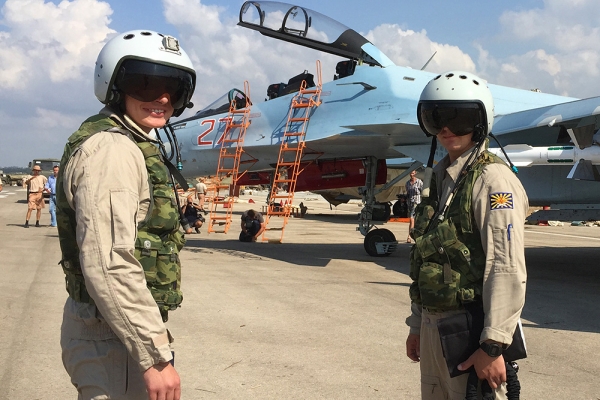
To an outside observer it may seem rather strange. Russian fighters form one of the largest groups among the foreign fighters of the “Islamic state (a terrorist organization banned in Russia — approx. ed.). For more than 10 months, Russia is actively involved in the Syrian conflict. Russian North Caucasus still remains extremely unstable region. The Kiev group of the Crimean Tatars have promised to take direct action against what they call the Russian occupation of the Peninsula. However, while in Russia was not recorded a rise of extremism that has affected France, Belgium and Germany. Why?
Let’s start with the fact that this view is incorrect. In the crash of a passenger plane over the Sinai Peninsula on 31 October 2015, Russia lost more men than France lost in all the recent terrorist attacks, combined 224 people. It is believed that this attack was organized by local jihadist group that has sworn allegiance to Islamic state. The attack occurred just one month after the start of the military campaign in Syria. Since air travel between Russia and Egypt is the favorite destination of many Russians — and were not renewed, and this suggests that the threat remains.
“Islamic state”, of course, keeps Russia at gunpoint. The militants, who have sworn allegiance to ISIS (a terrorist organization banned in Russia — approx. ed.). committed several terrorist attacks in Dagestan. The Federal security service of Russia reports on the increase in the activity of potential terrorists across the country. The emergence of potential terrorists and bombers is expected in several Russian regions. One of the stated reasons for the decision of President Putin to launch a military campaign in Syria was to fight the enemy on his territory, and not wait until he comes to Russia.
So far in Russia there has not been any major terrorist attack. The Russian passenger plane crash in October last year was when he rose into the air from an Egyptian airport. More than a dozen Russian soldiers killed in Syria, were killed in the fighting. Concerns, often expressed in the West ahead of the Olympic games in Sochi, fortunately, not materialized. No doubt, the Russian security services have vast experience. Russian anti-terror laws, which are already pretty tough, becoming even tougher. And Chechnya, which in the past was the main source of problems in Russia is under strict control of its leader, Ramzan Kadyrov, who calls himself a “soldier of Putin.”
Given all this, it is possible to speak about existence of significant differences between Russia and Western Europe, which has become the main target of militants linked to or inspired by ISIL. In Russia, the Muslims and the Orthodox majority lived side by side for many centuries. Integration has not always proceeded smoothly, however, Russia has already formed a perfectly acceptable way of coexistence at all levels. Islam is the official religion recognised by the state, along with Orthodox Christianity, Buddhism and Judaism. The vast majority of Muslim migrants working in Russia come from former Soviet republics in Central Asia. Like the foreign workers in Europe in the 1960s and 1970-ies, they are either looking for temporary work in the territory of Russia, or trying to gain a foothold there and to assimilate. Overall, the Imperial legacy of Russia and its multinational and multi-confessional nature soften the impact of Islamist terrorism.
Do not forget about the bitter experience in the 1990s and early 2000-ies — the period of the Chechen war. Then the attacks have become a tool that is often used by extremists in Moscow and other cities. The explosions occurred in a passenger plane, in subway stations, apartment buildings, and hospital patients, visitors theatres and students taken hostage — and all this against the background of the bloody battles in the Northern Caucasus. This war is long over, but the preservation of peace in the region is one of the main objectives of the Kremlin, which explains terms unique to the agreement which actually exists between Putin and Kadyrov.
None of the above gives the Russian authorities the reason for excessive arrogance. Currently, the greatest concern brought up in Russia jihadists, the followers of ISIS, and the militants returning from Syria — along with the extremist groups who continue to conduct their subversive activities in the North Caucasus after the Chechen war. But on the horizon appeared a much more serious threat. The Russian military campaign in Syria, although it is limited, in fact, has no clear temporal boundaries. In addition, it may be only the first part of a series of possible campaigns along Russia’s southern borders.
After almost 15 years after the start of the American military campaign in Afghanistan, the country remains unstable. The two largest Central Asian countries — Kazakhstan and Uzbekistan — may soon face a very difficult transitional periods, as their presidents, which was well over 70, are preparing to leave the scene. Smaller States of the region — Tajikistan and Kyrgyzstan — are also facing many challenges that affect their stability. Given the fact that the Russian border with Kazakhstan, the longest border in the world — controlled by far not as tough as other Russia’s borders, and that borders Central Asia as a whole cannot be called reliable, that the flow of jihadists through them — this is the likely scenario that must be carefully managed. Although Russia is now again entered into a confrontation with the West, she faces a very real danger coming from the South.








